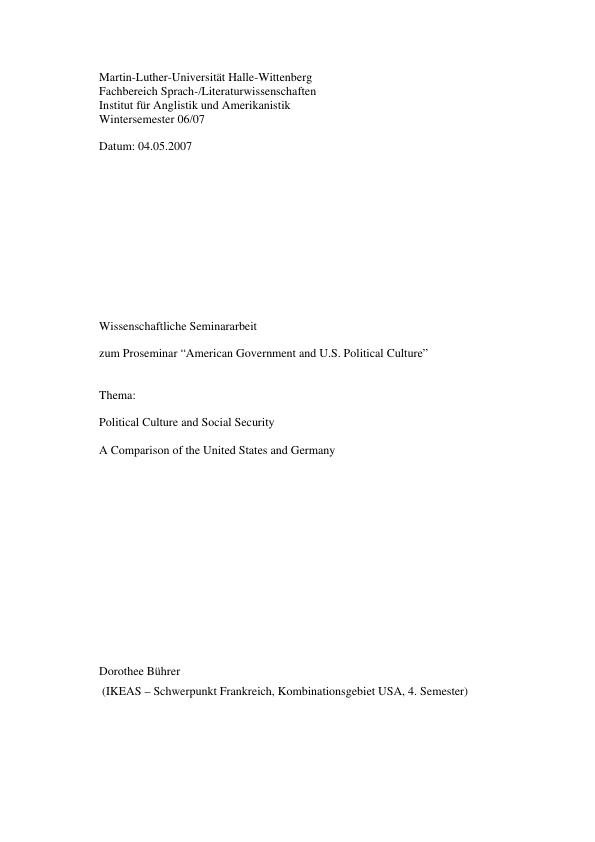In this paper, it should be examined in which ways the difference in creating a social system by the state can be connected to cultural values which shape the political culture of the respective country. Of course, there are many other components which influence the development of social security in the United States like industrialization or economic growth. In the media one gets the impression that individualism is responsible for the unusual kind – from a German point of view – of social policy in the United States (Murswieck 1988: 8). Also David McKay emphasizes the fact that “nothing more accurately seems to represent Americanism than a stress on individual rather than collective action” (2001: 11). But is individualism the only reason within cultural values for the belated public social policy in the United States?
Inhaltsverzeichnis (Table of Contents)
- Introduction
- Historical Development of Social Policy
- United States
- Germany
- Definition of Political Culture
- Dominating Cultural Values
- Liberal Principles: Individualism, Equality, Freedom and Protection of Property
- The Cultural Values Religion and Civic Duty
- Social Policy in the United States: Latecomer or Exceptionalist?
- Conclusion
Zielsetzung und Themenschwerpunkte (Objectives and Key Themes)
This paper aims to explore the connection between cultural values and the development of social security systems in the United States and Germany. By examining the historical development of social policy in both countries, the paper seeks to understand how cultural values, such as individualism and civic duty, have shaped their respective approaches to social welfare.
- The historical development of social policy in the United States and Germany
- The influence of cultural values on social policy
- The role of individualism in shaping American social security
- The comparison of the United States as an outlier in social policy compared to Germany
- The relationship between political culture and social security provisions
Zusammenfassung der Kapitel (Chapter Summaries)
- Introduction: The paper introduces the topic of social policy in the United States and Germany, highlighting the differences in their social security systems and emphasizing the role of cultural values in shaping these differences.
- Historical Development of Social Policy: This section examines the historical development of social policy in both countries, with a focus on the United States. It discusses the emergence of private welfare organizations, the rise of public social policy in the 1930s, and the expansion of social programs in the 1960s. It also highlights the significance of the Social Security Act of 1935 and the "War on Poverty" under President Johnson.
- Definition of Political Culture: This section provides a definition of political culture and its relevance to understanding the development of social policy.
- Dominating Cultural Values: This section explores the key cultural values that shape the political culture of the United States and Germany. It focuses on the principles of individualism, equality, freedom, and protection of property, as well as the values of religion and civic duty.
Schlüsselwörter (Keywords)
The paper focuses on the key themes of social policy, political culture, individualism, social security, and welfare state. It examines the historical development of social policy in the United States and Germany, analyzing the influence of cultural values on the creation and evolution of social security systems in both countries.
Frequently Asked Questions
How do cultural values influence social security systems?
The paper examines how values like individualism in the US versus collective action in Germany shape different approaches to state-provided social welfare.
Is individualism the only reason for the US social policy model?
While individualism is a major factor, the paper also explores other cultural values such as religion, civic duty, and liberal principles like protection of property.
What are the key differences between US and German social policy history?
The US is often seen as a "latecomer" with a focus on private welfare, while Germany has a longer history of public social insurance systems.
What was the significance of the Social Security Act of 1935?
It marked a major shift in the US toward public social policy, followed later by the "War on Poverty" programs in the 1960s.
How is "political culture" defined in this context?
It refers to the set of shared values and beliefs (equality, freedom, protection of property) that determine how a society views the role of the state in providing security.
What does the term "American Exceptionalism" mean in social policy?
It refers to the idea that the US follows a unique path in social welfare, distinct from European models, due to its specific cultural and historical development.
- Citar trabajo
- Dorothee Bührer (Autor), 2007, Political culture and social security - A comparison of the United States and Germany, Múnich, GRIN Verlag, https://www.grin.com/document/88208



